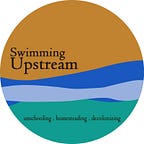Accountability, Oppression, and Internal Conflict
After the death of George Floyd, I (along with the rest of the world) was plunged into the world of the BLM movement. As a white person, I had so much to learn and devoured content on social media platforms, taking courses from black women, and discussing topics with my family and friends like white fragility, colonialism, oppression, and colour blindness. What I heard from these educators was that we could no longer shirk off responsibility and needed to be held accountable for our socially ingrained racism and ways that we contributed to system oppression. This resonated with me; having recently left environmental movements for what I felt was a lack of real intersectional understanding of issues and the unwillingness to call out people for injustice for fear of excluding them and making them uncomfortable. Finally someone was telling me that I should feel uncomfortable, that I should learn about the reasons I was feeling uncomfortable, and then I should be moved to action. And that I was doing the right thing for calling out others! I took to social media platforms with the intention of providing information and resources to friends and family that didn’t understand system racism and how we were perpetuating it. No stone was unturned. I lost friends because they refused to own up to their racism. I felt it was difficult but important work.
A few months later, after moving to a new home and community during the middle of the pandemic, I joined an online group for parents seeking like-minded people and a sense of community. For the first few months, I hung around and listened and learned a lot about how to be a better parent. But then something happened. There was a calling out of the organizers for being insensitive to a trans person, and this opened the flood gates for discussion around whether the community was a safe space. Having gone through the learning curve around creating safe spaces for BIPOC folks, I felt I was in a good position to share this knowledge around some of the language that was being used in the discussions. Phrases included “meeting people where they were in their journey” and “being sympathetic and understanding” which I felt conflicted directly with what BIPOC educators had shared. These phrases allow room for racism, homophobia, transphobia, and oppressive forces. It’s hard to be sympathetic with a bigot — with someone unwilling to change. I had no interest in meeting these people where they were in their journey. As a result of these discussions, I felt that this community was no longer a safe space and decided to leave. There were other members that also decided to leave and we connected through other social media outlets to talk about what had happened. These folks confirmed what I had felt, which further entrenched the feelings my gut had been telling me throughout the last few years: accountability was important in fighting oppression, and far too many people were not willing to be accountable for their actions.
A few months passed and my convictions stood. I was learning more about socialism, capitalism, Marx’s labour theory of value, and anarchism. I started a clothing swap as a means of positive direct action. I was donating regularly when I had funds to BIPOC folks through GoFundMe. But something was happening inside: while noticing that it all came back to the three Cs (colonization, capitalism, consumerism), I started to see the ways that my “woke” friends were continuing to participate in specific areas of these systems that still lead to oppression, sometimes in ways that I had stopped but sometimes in ways that I was also participating. I started to call myself out. I started to call my friends in. I wanted to maintain accountability because it felt important. I wanted this accountability to be a universal truth that could be applied to ALL systems of oppression, not just the one’s that were convenient or easy. And it started tearing me apart inside. Because despite my need for accountability, I knew that I existed, that we all exist, in systems where oppression is so ingrained that it was unavoidable. I could pick and choose which areas to better myself and live more inline with my values, but that it would be almost impossible to be accountable for all the ways in which I contributed to oppressive systems. While calling friends and family out in respectful ways was still important, I needed to be more understanding and sympathetic to meet people where they were, knowing that it’s actually impossible to be perfect in this regard.
“Meeting people where they are in their journey”. “Being more sympathetic”. Remember those from that community that I left? Well fuck. My self righteousness had driven me out of community, away from friends and family, and I feel super isolated. So my golden rule of accountability has become … fuzzy. I still believe that accountability is important and that people should be informed when their actions contribute to systems of oppression. Otherwise it’s just business as usual and that’s not going resolve anything. But the expectation for everyone to be accountable for all their actions, especially ourselves, is incredibly self damaging. And sometimes all consuming.
This is where I am right now. I know these two truths to be real at the same time and the conflict they cause internally feels like it’s going to tear me apart some days. It’s causing long bouts of depression. It’s making me distant from my partner and kids. And mostly because I know that while these two conflicting truths exist in my mind, they also drive me away from the community that I’m trying to find. They make me feel alienated and distant, like I don’t trust myself around people anymore. I’m trying to learn how to live with this conflict while also still making progress forward towards living my ideals and finding community.
